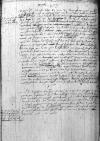Unser bothe, den wir zu ⌊Braunsberg⌋ negst an ko(nigliche)n hoff schickten, ist vorgestrigen(n) tage wider an(n) uns gekomen(n) bey demm uns superinscribed in place of crossed-out un(n)d von⌈un(n)d von bey dem(m) uns bey demm uns superinscribed in place of crossed-out un(n)d von⌉ ⌊ko(nigliche)r m(ajeste)t⌋ / ewrenthalben und der pension, / die wir vor euch uff Marienburg gebet(en) on the margin⌈und der pension, / die wir vor euch uff ⌊Marienburg⌋ gebet(en)und der pension, / die wir vor euch uff Marienburg gebet(en) on the margin⌉, vortrostlich uff unser schreiben(n) geantwurt, das disse ir m(ajeste)t den h(e)rn Kostkas hie im lande ⌊schaczmeister(r)⌋ hab zu sich gefurdert, durch den superinscribed in place of crossed-out wan der werde ankomen(n)⌈wan der werde ankomen(n) durch den durch den superinscribed in place of crossed-out wan der werde ankomen(n)⌉ / wil ir m(ajeste)t mit im(m) un written over mi⌈miunun written over mi⌉ser vorbitt nicht vorgessen(n) nochkomen(n). / Derwegen(n) wir gutter hoffnung sein, / weil wir ouch gemeltem h(e)rn ⌊schaczmeister⌋ derhalben(n) vor euch / v written over s⌈svv written over s⌉or seinem(m) auszcog (: wie ir im superinscribed⌈imim superinscribed⌉ negst(en) von uns vorstanden(n) :) vor euch haben(n) geschriben(n), / der zuvorsicht, werde sich hir inne gen uns wilferig beweisenn superinscribed in place of crossed-out halt(en)⌈halt(en) beweisen(n) beweisenn superinscribed in place of crossed-out halt(en)⌉ etc.
Wie es in ⌊Hungern(n)⌋ im abczoge des ⌊Turk(en)⌋ / und bey ⌊Ro(mische)r kay(serliche)r m(ajeste)t⌋ im zcoge in ⌊Francreich⌋ / ergangen(n), / und ⌊Paris⌋ belegert, / den ko ⌊turkischen konig⌋ biss gen ⌊Leon⌋, / sein leczste houpt superinscribed⌈houpthoupt superinscribed⌉stat an ⌊Sweicz⌋ stossend, / getriben(n), / hab wir euch, / wie eim alten kriegman(n), in beigelegten lateinischen zceitungen / nicht wollen(n) vorhalten(n), / die wirt euch der pfarrer bey euch gern(n) auslegen(n). / Wan ir die gehort, / werdet ir sie unserm(m) official, h(e)rn ⌊Jorg(en) Doner(r)⌋, / neben(n) unserm(m) ⌊⌋ an in zuschick(en) etc. Es sol uns ouch ein huchsshoupt rotwein und ein ton(n)e bir danczker getrenks superinscribed⌈ danczker getrenks danczker getrenks superinscribed⌉ von unserm(m) svager(r), hern(n) ⌊Jorgen Scheffken⌋, an euch zukomen(n), / das lost biss gen ⌊Wormenith⌋ wol vorwart / mit einem(m), der gut acht daruff habe, / furen(n) und unsermm superinscribed in place of crossed-out den⌈den unserm(m) unsermm superinscribed in place of crossed-out den⌉ burgermeen do selbst befhelen(n), / das ers dergleichen(n) mit den ersten(n) an uns losse bringen(n). / Daran(n) geschicht uns wolgefalner dienst. /

 AAWO, AB, D7, f. 13r (t.p.)
AAWO, AB, D7, f. 13r (t.p.)